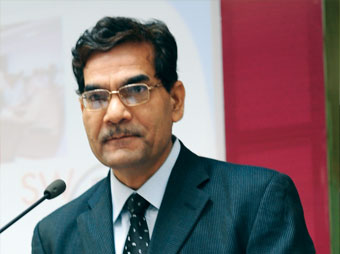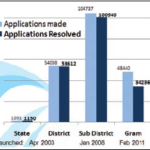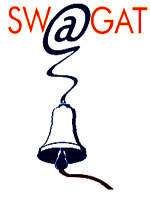
Gujarat takes a technology-based approach for addressing public grievances
A K Sharma, Secretary to the Chief Minister and CEO, Gujarat Infrastructure Development Board
The State Wide Attention on Grievances through Application of Technology (SWAGAT) initiative is an exemplary programme that has won several accolades including the UN Public Service Award in 2010. Initiated in 2003, SWAGAT has been running very successfully for the last eight years. SWAGAT owes its inception to the Hon’ble Chief Minister of Gujarat who believes that an effective grievance redressal system is extremely important. Developed almost completely by NIC, the scheme has impacted 208,416 applicants and almost 91 percent of cases have been resolved. Various types of grievances, some even involving changes in government policy, and long-pending cases have been resolved through the system.

Benefits of SWAGAT
Before the launch of SWAGAT, public grievances were not handled systematically. The paper-based process was cumbersome and lengthy and there was no mechanism for monitoring and follow-up. There was no transparency in the system and officials had no fear of being exposed. Further, the common man had no access to the higher authority. SWAGAT has brought in transparency and during the sessions, all stakeholders are present in real-time. The Hon’ble CM directly reviews the cases, hence ensuring compliance. Inputs from everybody including the citizens, key officers and elected representatives are consid-ered, which ensures fairness of the system. The project has made the highest authority aware of the nature of problems that exist at the local level. Further, the responsiveness, accountability and awareness of the local administration have also increased.
The Process

 The state-level SWAGAT meeting is conducted on the 4th Thursday of every month. In the morning, the grievance applications are registered online at SWAGAT Office, details of which are immediately available to the concerned officers. In the next phase, the officers enter information and responses online. The Hon’ble Chief Minister and senior officers then interact with applicants and the district and sub-district officers attend the programme through video- conferencing. Based on the decisions taken, cases are redressed on the same day or in time-bound manner and all directions given by the Chief Minister are formally recorded. First-time complaints are handled by at lower levels of administration and unresolved cases move up the government hierarchy.
The state-level SWAGAT meeting is conducted on the 4th Thursday of every month. In the morning, the grievance applications are registered online at SWAGAT Office, details of which are immediately available to the concerned officers. In the next phase, the officers enter information and responses online. The Hon’ble Chief Minister and senior officers then interact with applicants and the district and sub-district officers attend the programme through video- conferencing. Based on the decisions taken, cases are redressed on the same day or in time-bound manner and all directions given by the Chief Minister are formally recorded. First-time complaints are handled by at lower levels of administration and unresolved cases move up the government hierarchy.
The Infrastructure
 SWAGAT operates on the Gujarat State Wide Area Network (GSWAN) that connects all 26 districts to state data centre with 2-8 Mbps bandwidth. This is based on leased circuits
SWAGAT operates on the Gujarat State Wide Area Network (GSWAN) that connects all 26 districts to state data centre with 2-8 Mbps bandwidth. This is based on leased circuits
provided by BSNL, Reliance and Tata Tele Services that interconnect 8,496 district and sub-district offices. 23,017 user IDs have been created for government officers, under this scheme. The video conferencing centres are located across 26 department offices, 26 district offices and 239 sub district offices. The platform used is Microsoft Dot Net 2.0 as front-end and SQL server 2005 as back-end. The system is totally transparent as applicants are given a unique ID through which they can access their case details and status online from anywhere.
The Impact
The scheme has provided quick relief and satisfaction to the common people when grievances were addressed at the highest level. Severe action was taken against delinquent officials. Farreaching policy changes were brought about and administrative processes re-engineered.
Be a part of Elets Collaborative Initiatives. Join Us for Upcoming Events and explore business opportunities. Like us on Facebook , connect with us on LinkedIn and follow us on Twitter, Instagram.











